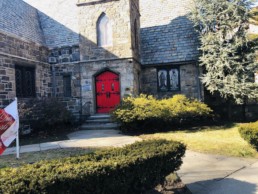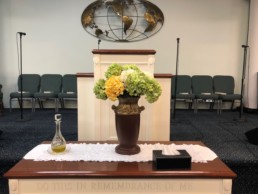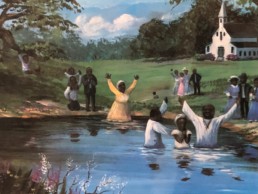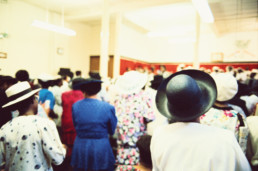Blessed are the Top 10
Blessed are the Top 10
Kelly Davis | kwd2111@columbia.edu
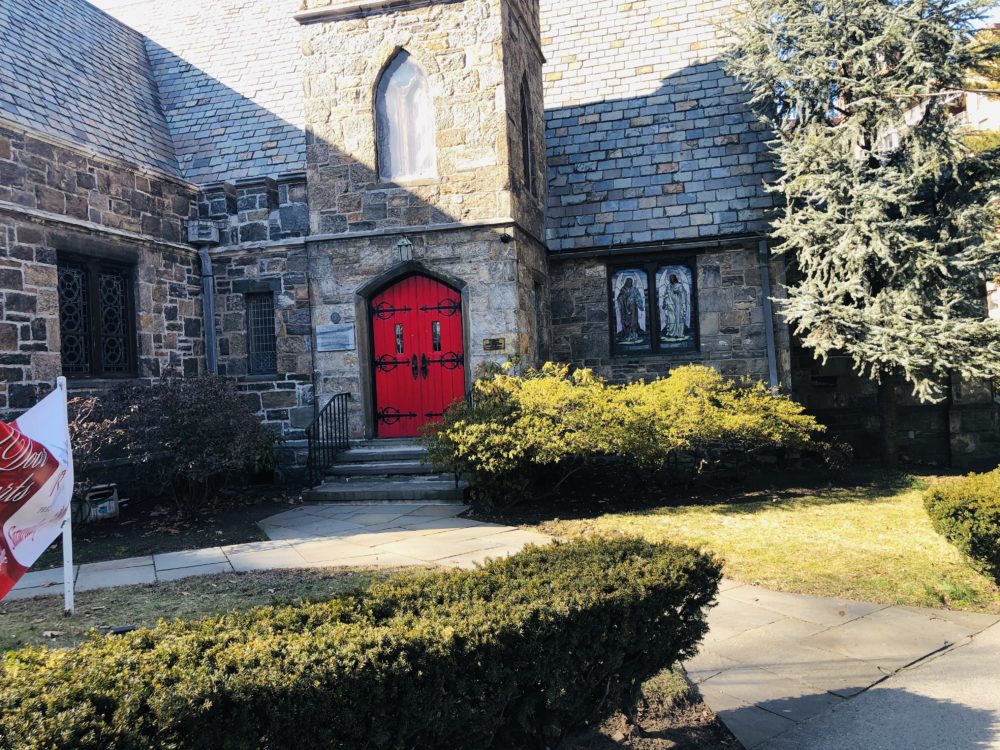
It’s Oscar Sunday, and in a Gothic-style church in the Riverdale neighborhood of the Bronx, people of all ages and races sit patiently in the quiet sanctuary. Reverend Krystin Granberg rests her arms comfortably on the pulpit as she begins her sermon for the 10:30 a.m. service at Riverdale Presbyterian Church, located at 4765 Henry Hudson Parkway. Her topic is not a Bible verse. Her message is not fire and brimstone.
“I love Oscar Sunday even more than Super bowl Sunday,” Granberg begins. Church-goers respond with a chuckle and the solemn faces in the room seem to be at ease a little bit.
Much to my surprise, Granberg’s message is centered around today’s pop culture. She speaks about the trend of “top 10” lists.
Top 10 movies of 2019
Top 10 vegan restaurants in NYC
Top 10 ways to get fit in the new year
But religion isn’t far behind. “Jesus has a top 10 list, too,” she remarks.
She proceeds to introduce a familiar passage from the bible most commonly known as the beatitudes.
“Blessed are the poor in spirit, for theirs is the kingdom of heaven.”
“Blessed are those who mourn, for they will be comforted.”
“Blessed are the meek, for they shall inherit the earth.”
Matthew 5: 3-5
She compares the beatitudes with the to do lists that modern-day culture sets for us to be successful. Granberg explains that the bible verses and other similar scriptural references are not the top 10 lists like the world gives us, but rather a list of things that have already been done.
When Jesus recites the beatitudes, he is not saying what believers must do in order to be good Christians. Rather, he is explaining what the kingdom of God presents, as gifts, to those who believe in Him and his message of salvation.
Tying her message back to the Oscars, she recalls one of her favorite movies, “Monty Python’s Life of Brian.” While the movie offered her powerful lessons that she still holds today, Brian, the farcical main character, was just as persecuted as Jesus was for spreading the message of salvation. Brian’s struggles in various scenes of the movie reflect Jesus’ own challenges.
Granberg reminds the congregation that they should not ask God what to do to be worthy of His love, instead to know that any shackles of anxiety, fear, depression and worry have already been broken. The kingdom God is about being rather than doing, she says. We are already blessed, and there is nothing more that we need to do to be approved. She adds that the only thing the Lord requires of us is to, in the words of the Prophet Isaiah, do justice, love kindness and walk humbly with the Lord.
She also says that if she had the chance, she would write additional beatitudes and include things like:
Blessed are the truthtellers
Blessed are the caretakers
Blessed are the peacemakers
And above them all: Blessed are the rulebreakers, who advocate for the most destitute of society.
She says that she was perplexed that so many people are confused with what others are not doing. This creates a culture of people that are so anxious about what they are or not doing, they end up projecting their feelings of failure onto others. Referring back to the to do list, Granberg points out that church gives everyone an opportunity to be critical.
As the sermon wears on, she goes back to the phrase of what the bible requires of us: to do justice, love kindness and walk humbly with the Lord. She cites biblical figures that ministered to lepers and preached to them about the love of God.
Closing her sermon, Granberg says that in trying to make a difference in this world, we can start by impacting each and every person we meet. She pleads that in this world of chaos and turmoil, her congregation preaches cheerfulness and radical love.
The Holy Spirit
The Holy Spirit
Zoé Chevalier | zc2504@columbia.edu
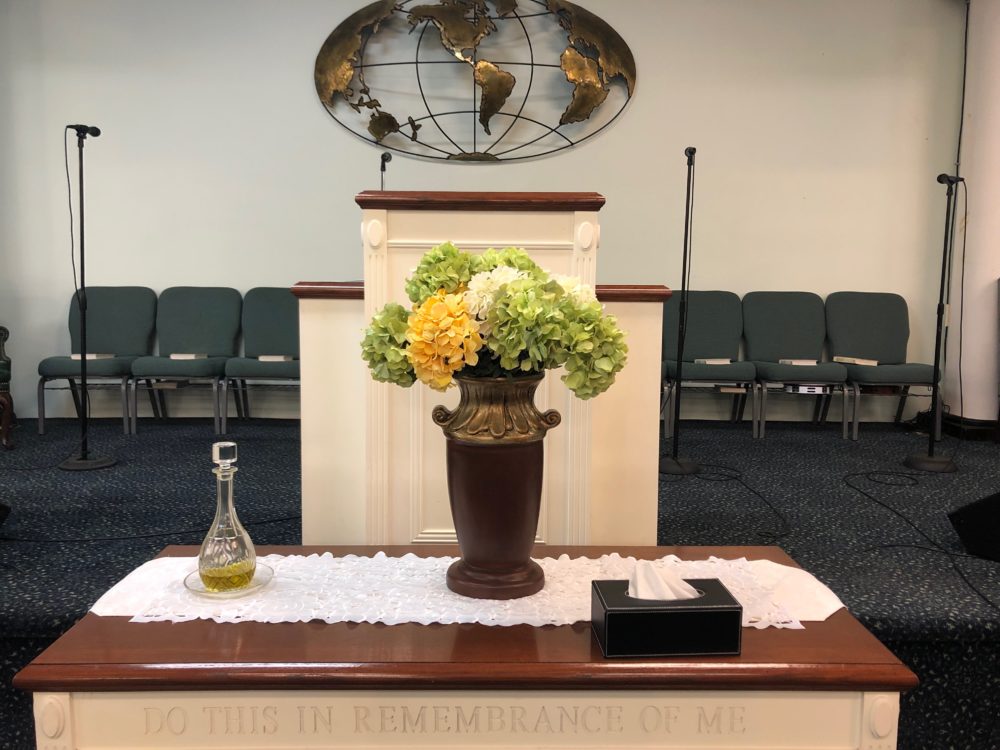
The congregation slowly gathers inside the prayer hall at the United Pentecostal Church on 125th Street, between Broadway and Amsterdam. Sunday school ran a little late, but that’s ok, there are no formal hours here. The prayer service will last for about two and a half hours, but none of it will be passive: Worshippers will stand, move, dance, and sing.
Rows of chairs face a stage, where microphones and instruments—an electric piano, drums and a tambourine—signal the singing to come. No crosses, stain-glass windows or icons of saints can be seen here. Although Pentecostals believe in Christ, the traditional crucifix found in Catholic churches is replaced with a large statue representing the earth and a collection of flags from different countries. In front of the pastors console is a wide communion table, covered by a white veil. “It’s to make it look religious,” says Pastor Michael Grattan.
Patrice Martin has come all the way by bus from Philadelphia to be here today. Grattan witnessed to her 40 years ago, when she was a college student. “He saved me,” says Martin. But she feels directionless, and came to the Church to reconnect with the one who once helped her. Martin does not want to bother him, and so she sits in a corner. When the pastor comes to say hi, she introduces herself as Sister Patrice Martin. He thinks about it and says, “That’s strange. I witnessed to a Sister Patrice many years ago.” They fall into each other’s arms.
One of the singers, dressed in all white comes up to the audience, arms opened. “Let’s have a group hug,” she says. Slowly, she walks away into a corner of the room, where worshippers gather. A circle is formed. At first quiet, the circle soon comes to life. The Holy Spirit is about to arrive. Worshippers are moving their hips and raising their hands, opening their mouths wide. The rumble of their feet on the ground creates vibrations, which are growing throughout the church.
A symphony of different languages is spoken all at once: English, French, Spanish and many other languages that I do not recognize. Most of it is unintelligible, with a repetition of “Amen” and “Hallelujah,” creating a rhythm, and growing faster, louder, more passionate.
Another singer is brought into the middle of the circle. Surrounded by her peers, she bangs her chest right above her heart and moves her hands to the rhythm of her words. They are praying for her. Some are smiling, looking up at the heavens, at times letting out a powerful laugh.
Others give out painful moans, bow their heads.
Brother Philippe comes up to me and explains in French. “They are letting the Holy Spirit speak through them. They just open their mouths and let him speak.” Like many people here, Philippe was once a Catholic, but he grew tired of needing intermediaries to speak with God. Pentecostals do not believe in the Virgin Mary as the first interlocutor. “It’s like parents with their children,” explains Philippe. “You do not need to have your mother always intervene on behalf of you to your father, you have to go directly.”
Pentecostals believe in a direct approach to the Lord. No Saints, no Virgin Mary is needed as intermediary. Once a person has been “saved,” the previous “sinner” becomes a saint. All baptized members of the church are saints. They can speak directly to God, and let the Holy Spirit speak through them. They are also called to “witness” to other “sinners,” and transmit the word of the Lord.
This ritual is rooted in the day of the Pentecost, a passage in the Bible’s Book of Acts, the fifth book in the New Testament. According to Acts 2:4, the Holy Spirit descended upon Jesus’ apostles, baptizing them in the Holy Spirit, “and there appeared unto them cloven tongues like as of fire, and it sat upon each of them. And they were all filled with the Holy Ghost, and began to speak with other tongues, as the Spirit gave them utterance.” Pentecostals believe in a literal interpretation of the Bible, and see speaking in tongues as an act that can happen at any time, to anyone who has been saved.
This speaking in tongues continues throughout the service. Sometimes, as Grattan is preaching, someone will start laughing uncontrollably, someone else will speak in a different language. Once some people started making snake-like noises in the back of the room, the hissing sounds growing louder. When the Holy Spirit wants to speak, you let him in. As the service progressed, Grattan’s sermon grows more passionate:
“Don’t waste your alone time and your suffering, praise the Lord and nothing should offend you. If you can’t run, walk, and if you can’t walk, roll, but keep following God. We are the chosen people, the Second Testament says so! We are like the Jews.”
Suddenly, he stops, and the voices in the crowd go silent. One by one, some worshippers go up in front of the stage and kneel in front of the pastor, waiting to be blessed. A pregnant woman bows with difficulty. Children run up to the stage.
The adults wait patiently as Grattan slowly kneels to their level, holds their head and whispers “In the name of Jesus Christ.” Slowly they go back to their seats, calmer, blessed. Sister Patrice stayed in her seat the whole time, her eyes closed, praying. At times, she called out “Amen, Halleluyah.” A glorious smile was spread across her face.
Job and the Super Bowl
Job and the Super Bowl
Zoé Chevalier | zc2504@columbia.edu
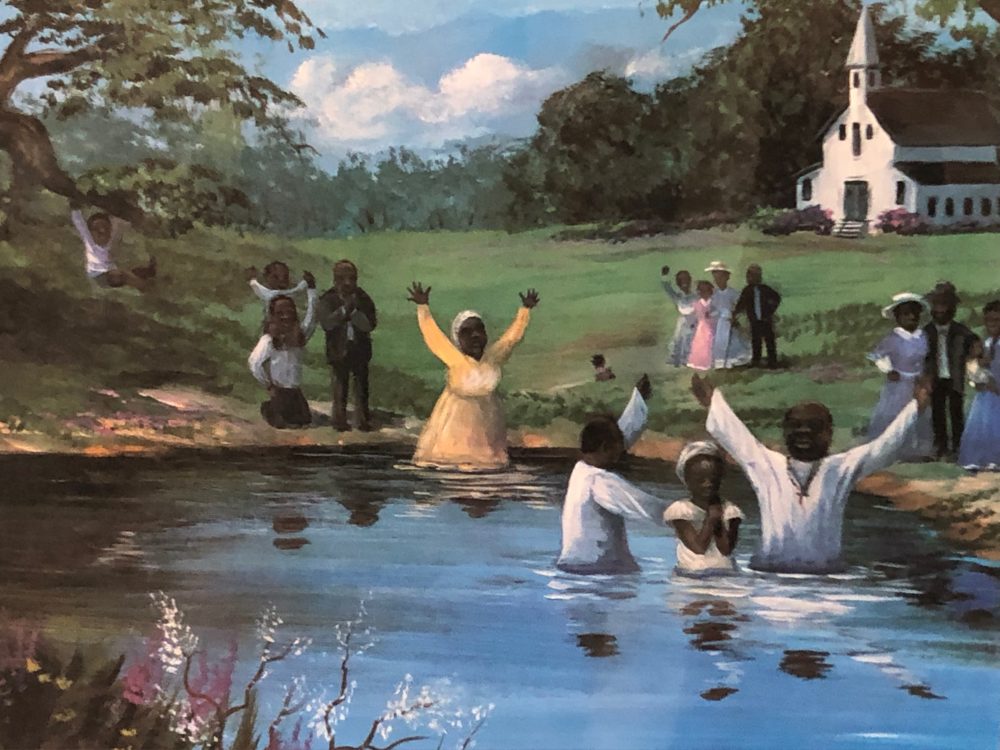
Fewer congregants come to Bible study on Wednesdays than on Sundays at the United Pentecostal Church in Harlem. But it is no less spirited. On a recent Wednesday, seven worshippers sit in the prayer room in front of Pastor Michael Granttan. Despite his whitening hair, Grattan is an energetic man, often jumping to his feet to illustrate a lesson. He is dressed in casual clothes: A knitted sweater and pants have replaced the suit of Sunday’s service.
Grattan’s teaching style is a combination of Bible verse study, personal anecdotes, sports references and modern-day cultural applications. During the first part of the lesson, people in the audience are encouraged to ask all the questions they want, both Biblical and personal.
A young woman, whom I recognize as one of the singers of Sunday’s service, starts off by asking, “How do we know if the hardship we have been given comes from God?”
She proceeds to tell the tale of a family member who had been diagnosed with breast cancer and refused treatment, waiting for God to cure her. One day, she went to a naturopathic doctor who gave her an ointment to put on her breast. This, she said, led to an emergency mastectomy. The woman found out that during the year and a half that she had not been given treatment, the tumor had not metastasized. She praised God for protecting her. Her husband, however, blamed her for losing faith and getting the surgery, saying that God was not done curing her.
Hearing this story, Grattan stands, raises his arms and starts preaching the story of Job from the Book of Job, which is part of the Old Testament.
“Job’s animals were kidnapped!
The house fell over his children!
And then he got sick! And we know there is nothing more personal than disease. There was puss coming out of his body, it was truly horrible, but he never stopped praising the Lord.”
Grattan then uses one of his favorite sports allegories to illustrate his message: “Job was hit so hard, like in a boxing ring, poom the boxer, he got a hit with a right fist then a left fist, then he got a full-body blow!” Mimicking the scene he throws his fists in the air, punching an invisible Job.
Soon, he sits back down, saying, “We know that God gave him those hardships, but generally speaking, there are no parameters that define whether or not a hardship comes from God, we create a lot of our own problems, but we need to continue to praise God no matter what.”
He adds that he believes in going to the doctor, because “God can cure you anywhere, on the operating table as well as in your kitchen, so let him cure you though your doctor.” With a deep sigh, he concludes: “I understand, as you know sister Grattan died recently.” The crowd goes silent. Everyone knows about the recent death of the pastor’s wife to cancer.
During the second half of the session, Grattan doesn’t shy away from getting into contemporary pop-culture discussions. He comments on the Superbowl half-time show, featuring Shakira and Jenifer Lopez, saying, “I don’t understand all the fuss about the fact that it was not family-friendly.” When someone brings up that Jennifer Lopez might have been mocking the sign of cross, he defends her. “No! She was simply pole dancing!”
Grattan often tries to tone down more conservative branches of the church. “I believe in balance. God is not stupid, only human beings are. Be careful about turning principles into law.” When someone in the church asks if women are allowed to wear pants, he says of course. “And what about swimsuits?” asks a man. “Is it true we are not allowed to go to the beach or swimming pool even on a hot day?” Another woman laughs. “I go to the beach!” she says. Grattan ends the discussion saying, “Yes you can. I also believe that there are apostolic swimsuits that are more modest.”
At the end of the study session, Grattan gets more serious, and passes around a sheet of paper: “A brief look at the errors of the doctrine of the Trinity.” The document is filled with typos as the pastor has “whipped it out” quickly this afternoon. Once again, Grattan stands up, agitated.
“99 out of a 100 times, 999 out of 1000 times..”
His voice grows louder.
“9999 out of 10000, and I could keep going… people turn to Genesis 1:26 to justify that God is plural.”
Genesis 1:26 is part of the Old Testament and says: Then God said, “Let us make mankind in our image, in our likeness, so that they may rule over the fish in the sea and the birds in the sky, over the livestock and all the wild animals,[a] and over all the creatures that move along the ground.”
Everyone pulls out their phones to look up the verse, and the pastor continues. “Scholars understand that this is not what this verse means, the clergy understands, but no one is teaching laypeople!” According to the Pentecostal Church, God, Jesus and the Holy Spirit are all part of the same entity, not separate beings. He sits back down: “Do you understand?”
A woman in the back raises her hand shyly. “I think that it will make sense once I really go through the scripture,” she says.
“Yes, you need to keep asking questions and work hard, I can’t give you understanding,” Grattan concludes. As the clock strikes 9 p.m., all rise and pray together.
Silent Tears
Silent Tears
Annick Laurent | acl2220@columbia.edu
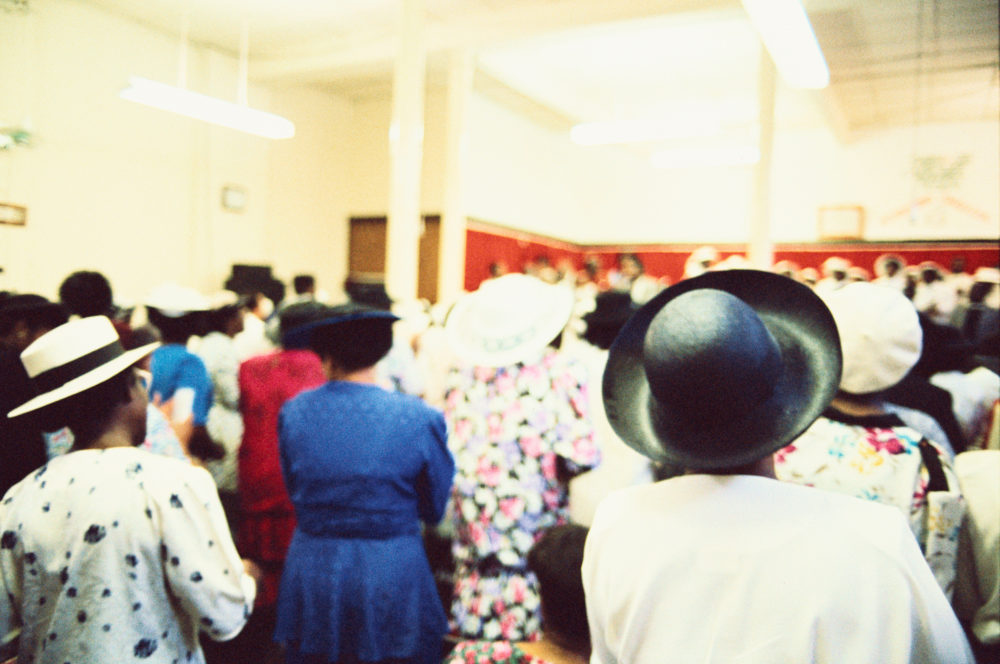
On a recent Sunday morning, the Sanctuary Choir at the Convent Avenue Baptist Church in Harlem sits relatively still, with the exception of those fanning themselves with the day’s programs. There are about 40 choir members, all dressed in bright blue robes with kente cloth embellishments sewn on the shoulders.
On the church floor, white-gloved ushers are guiding late comers across the wine-colored carpet to the few remaining spots in the roughly 1,000-seat church. Above the choir is an arch with the phrase “One Lord, One Faith, One Baptism,” painted on it in all caps.
Seconds later, Dr. Gregory Hopkins, the choir’s director, gives the singers the cue to rise to their feet. A familiar melody fiercely erupts from the organ. It is “Lift Every Voice and Sing” and it is sung by the choir with palpable pride to commemorate Black History Month and honor the souls of ancestors who fought for freedom.
The instrumental version of the first line plays once:
“Lift every voice and singgggg...”
Ed Broms, the organist, held on the note for “sing” in the opening line with a key on his left hand as his other one fluidly moves through the right side with ease. Light flute-like notes flutter in the air with quick succession, layered the deep “sing.”
Broms repeats the opening phrase a few more times, going higher on the scale with smooth transitions.
With the grace of a dancer, Hopkins raised his arms with pulsing wing-like motions to the beat of the spiritual. The choir followed his pace.
The first stanza is delivered in staccato fashion:
“Lift every voice and sing
Till earth and heaven ring
Ring with the harmonies of Liberty
Let our rejoicing rise
High as the list'ning skies, let it resound, loud as the rolling sea.”
The tenors and sopranos distinguish themselves in tone and delivery. The women repeat “lift every voice and sing” at the end of each line
“Sing a song full of faith that the dark past has taught us
Sing a song full of the hope that the present has brought us
Facing the rising sun of our new day begun
Let us march on, let us march on, ‘til victory is won”
Originally conceived in 1900 as a poem, “Lift Every Voice and Sing” was penned by James Weldon Johnson, who was a lawyer and high school principal before pursuing a writing career full-time. J. Rosamond Johnson added the music to the ballad five years later, giving its poignant lyrics a vivacious uplifting accompaniment. Their collaboration is often regarded by African Americans as the “Black National Anthem” in addition to being a hymn that calls on God for aid through strife and fatigue.
I am overwhelmed hearing it sung. The choir’s rendition takes me on a winding emotional rollercoaster. The preface is buoyant and encouraging in the first verse before it transforms into something reminiscent of a chant for steadily marching soldiers. It is a musical salute to the foreparents, acknowledgement of sacrifices along a rocky unrelenting treadmill of a path.
Greatly contrasting the thundering start, the next verse is a whisper by comparison.
We have come, we have come over a way
That with tears have been watered
We have come, we have come treading our path
Through the blood of the slaughtered,
Out from the gloomy past,
Where the white gleam of our bright star is cast.
“The slaughtered.” Unfallen tears put pressure on my eyes.
The notes become less divergent, almost meeting in the middle. The tune slows and takes a somber turn, embodying communal mourning.
God of our weary years,
God of our silent tears,
Thou who has by Thy might
Led us into the light,
Keep us forever in the path, we pray.
Lest our feet stray from the places,
Our God, where we met Thee,
Lest, our hearts drunk with the wine
Of the world, we forget Thee;
Shadowed beneath Thy hand,
May we forever stand.
True to our GOD,
True to our native land.”
The choir ended the song in a rich, dragging, reverberating “Amennnn.”
The Invitation
The Invitation
Kate Cammell | kac2261@columbia.edu
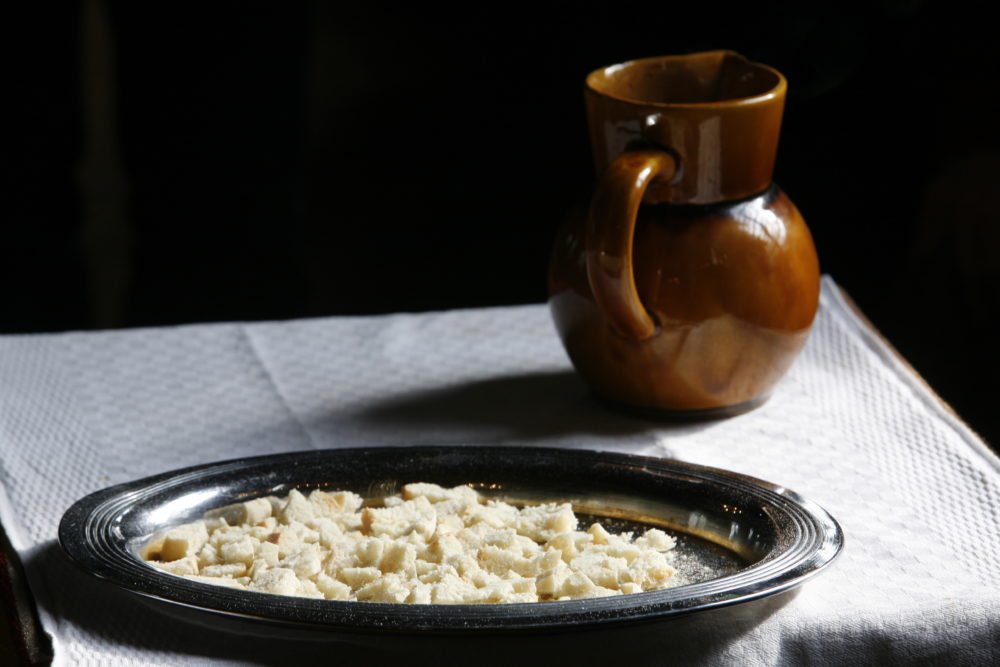
With her right hand placed over her heart and her left palm opened towards the balcony, Angela Lockett-Colas invited everyone in the church to join in the communion service. The stage lights above her shifted from ice blue to light pink and the eight-member praise band began to play a soft rock melody.
Forefront is an interdenominational church with roots in the Evangelical movement. It’s tucked along a Borem-Hill side street at 509 Atlantic Avenue. During a Sunday morning service, Lockett-Colas, Forefront’s creative director, told the congregation, “Communion is something we do because of the gift we have in Jesus Christ.” As the beat picked up tempo, she reminded the nearly 150 gathered people of the ways that Jesus suffered. “You might feel [persecuted] like that too but you’re loved. You’re loved,” she said.
As Lockett-Colas ushered congregants into the ritual, there was a fullness to her tone that felt assuring, like a mother comforting her children. She beamed as she summoned “anyone” to receive God’s love and to affirm their commitment to Him.
People stood below her on either side of the stage with wooden bowls of bread and large mason jars of red wine, symbolizing the body and blood of Christ. In the Protestant expression of Christianity, communion is a ritual where believers dip bread in wine, and as they eat the mixture they’re asked to reflect on Jesus’ sacrifice.
After Lockett-Cola spoke, members were initially slow to take communion. It was early, so people puttered, like the city buses that had ushered some there that morning. In the last row of the chapel, Georgina Orin followed her friend Grace Dowd into the aisle. Orin’s polka dotted dress sashayed on the wooden floor as she moved in time to the music. Orin, a Californian who once lived in New York, attends Forefront whenever she’s in town.
For Orin, communion is about taking a moment to think about herself in relation to the world around her. Despite the music and the whirl of the lights, there’s a stillness that believers talk about inside themselves. “I think communion is a way to remind you to nourish yourself and that you’re a part of something bigger,” she said.
After reaching the front of the line and dipping the bread in wine, Orin and Dowd made their way back down the aisle. Back at their seats, Orin rested her head on Dowd’s shoulder as they listened to the praise band. People around them raised their hands in the air and bounced on their heels, feeling the music and waiting for everyone to partake in the weekly rite.
Just in case anyone missed Lockett-Colas’s invitation, it was underscored by bold white letters on a large screen at the front of the chapel. “Communion,” the sign announced. Below that it read: “All are welcome at God’s table.” And for Forefront’s members who, like Dowd, identify as queer, seeing “all” written onscreen was key. It’s why many choose to take communion here.
Forefront became an LGBTQ-affirming church in 2014, a controversial move for an Evangelical congregation. The choice was met with loss of both members and funding, but the church stood by its choice. It’s website proudly reads, “We seek community that is inclusive of ALL people.”
Though communion is an individual practice, it’s undertaken—as its name implies—as a community. At Forefront that includes “Conventional Christians and questioning skeptics, Believers and agnostics, Women and men, those of all sexual orientations and gender identities, and Those of all classes and abilities.” It’s a church where juxtapositions are encouraged to rub shoulders.
This is reflected in the communion service as well—old tradition meets new meaning, and, for those who partake of it, a fortification with the warmth of red wine and dance on a chilly February morning in New York City.

